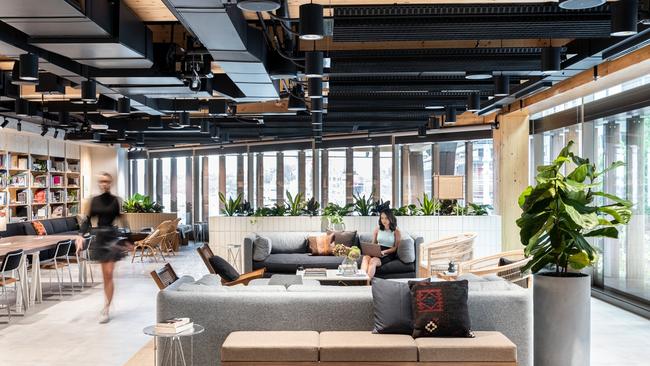Big office landlords seek to capitalise on WeWork’s US collapse by filling a potential void
The collapse of global flexible workplace giant WeWork in the US has potentially opened the door for other operators.

Hundreds of millions of dollars of leasing agreements in Australia are being renegotiated after the collapse of co-working giant WeWork in the US, as some of the country’s largest landlords are potentially seeking to fill the void and expand their flexible workspace offerings.
After months of speculation, WeWork Inc’s filing Chapter 11 bankruptcy in the US has sparked speculation over the future of the sector which has been hit by the pandemic and market high rental agreements. The model that WeWork and most of the other large co-working businesses operate is the taking of a long-term head lease and then sublease small spaces on short-term contracts.
However, an industry source said some of Australia’s biggest office landlords such as Dexus, Lendlease, GPT, Charter Hall, ISPT and Centuria have their own flexible work options and may expand their offerings in the wake of WeWork’s push to renegotiate lease terms and cut space.
Urban Collective general manager Laura Dawson said the landlord-driven model gained ground over the past 12 months.
“It’s interesting times in our industry,” she said. “We are landlord-owned and WeWork’s problems is almost proof that we are heading in the right direction.”

In October Urban Collective opened three levels after a $12m investment by the owner, JX Capital into the Big Bear Shopping Centre lifestyle precinct in Neutral Bay, Sydney.
It has signed up more than 50 new members and Ms Dawson said landlord-driven flexible workspaces “seems to be the direction things are moving”.
“There’s been quite a few of these landlord flexible space models pop up, especially in the last 12 months. There’s an added level of security for tenants rather than the sublease model,” she said.
WeWork Inc’s Chapter 11 process would only affect its US and Canadian operations and the company said its commitment to the loss-making Australia operations was “unwavering” despite being in lease negotiations with Australian landlords for months.
At the start of August it had 18 locations and about 100,000 sqm of space across Australia. Since then it has closed three properties – at 260 Queen St in the Brisbane CBD, 50 Miller St and 66 King St in Sydney – reducing its footprint by about 13,000 sqm.
It is understood WeWork is seeking to take a floor from its 7900 sqm lease in the Perron Group’s Central Park Tower on St Georges St, Perth, and is in talks to reduce its commitment at Lendlease’s Daramu House on Sussex St in Sydney.
Industry sources say WeWork is also in talks with Dexus Property over its lease in the character office building at 100 Harris St, Sydney.

The impact of the Covid-19 pandemic and work-from-home trend has hit flexible space providers hard and a number have closed.
The largest casualty so far has been Victory Offices, which listed on the ASX four years ago valued at $80m with 21 hubs, 500 co-working desks and had eight new spaces in the pipeline. It was placed into voluntary administration in late 2022, owing creditors millions. of dollars.
RiskTalk director and founder David Press – whose office is in WeWork’s Central Park tower in Perth – said there has been “too much scare mongering” over WeWork’s problems.
He said rival flexible-space companies were offering their services as a result of the bankruptcy.
“I’ve had emails saying if you’re a WeWork member we have space available,” he said.
“It has been going on since the WeWork bankruptcy was leaked, so about a week ago.”
Mr Press said his company has been a WeWork tenant since it opened in Australia and has never had a negative experience with it.
“There’s a lot of overreactions and misinformation going around,” he said.
“Personally I have not heard of a single concern from tenants. I’m not saying there aren’t but I’ve not heard it.”
Founder and chief executive of flexible office marketplace Rubberdesk, Jim Groves, said
it was likely to be “business as usual” for businesses working from a WeWork office.
“Centres that have closed have seen landlords work with other flex operators to run them, renegotiate contracts and keep the doors open,” he said.
“For years WeWork has been building great places to work that meet tenant demand for quality, flexibility and hospitality.
“Now, as they restructure their debt obligations in the US, I believe they are set to build a great business that will be around for many years.”





